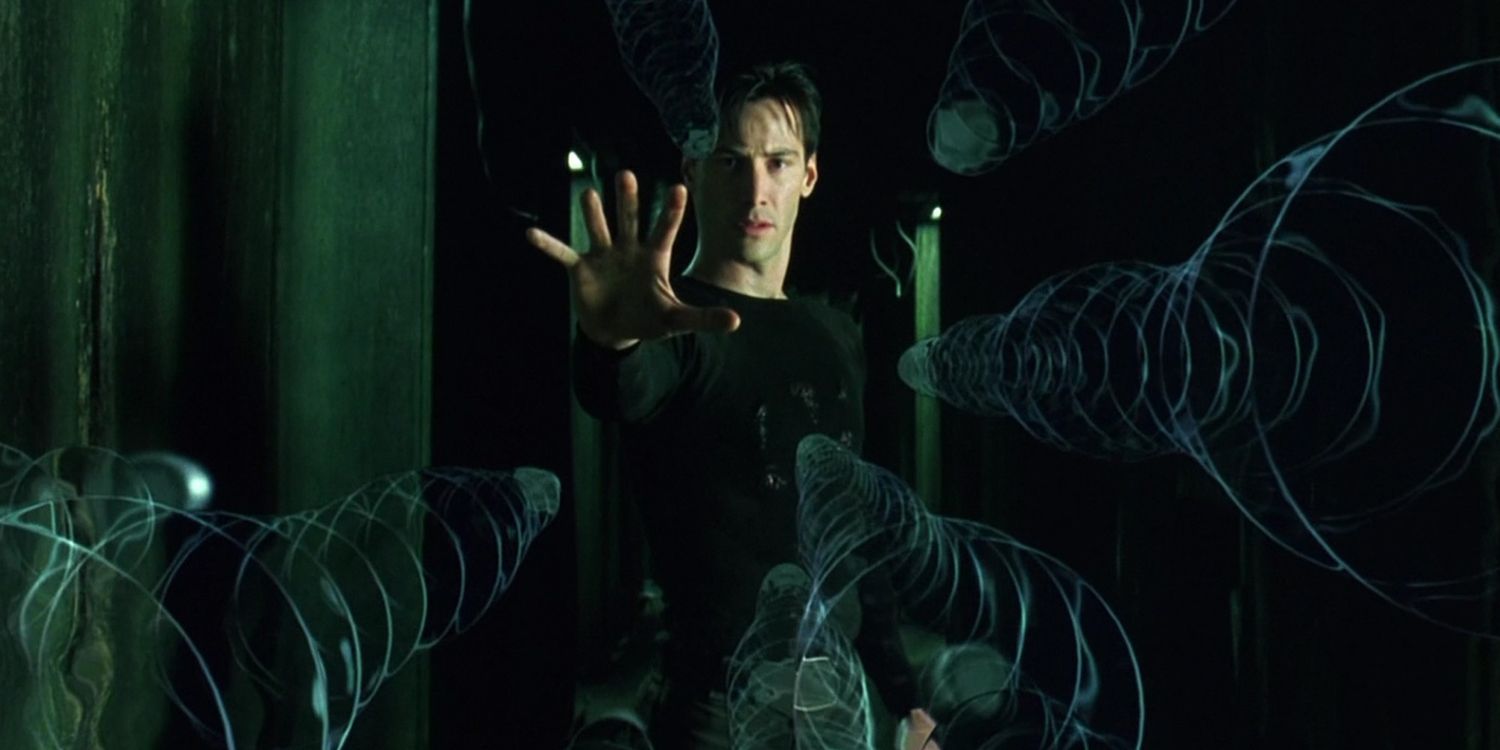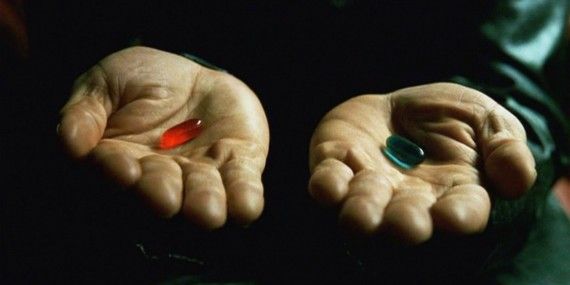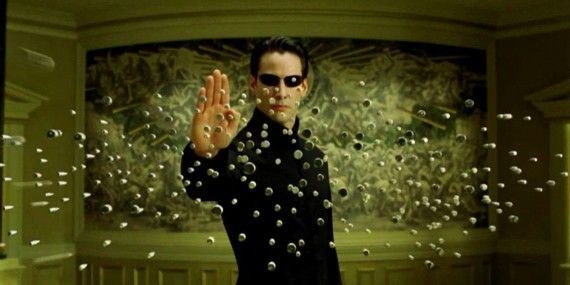When news broke that Warner Bros. is planning to reboot The Matrix, millions of movie fans went "Whoa!" According to reports, the studio is in the early, exploratory phase of development in relaunching the once-groundbreaking sci-fi franchise created by the Wachowskis. The only name attached to the project thus far is Michael B. Jordan (Creed), who is eyed to star in the reboot. For fans of The Matrix, a reboot could be cause for excitement. But we suspect for a great many more of those fans, especially those who were enraptured by the original Matrix in 1999 and were subsequently disappointed by its two sequels that concluded the trilogy in 2003, their reaction is more akin to: "Why?"
It's difficult to not greet the news of a potential return of The Matrix with cynicism. Though very little is known about the project currently, the names not mentioned as being involved in the reboot is already cause for skepticism. Thus far, it seems like neither Keanu Reeves, Lawrence Fishburne, Carrie-Ann Moss, nor the Wachowskis themselves are part of this new Matrix project. (Keanu did state last month he'd be open to return to The Matrix if the Wachowskis were involved.) No release date has been announced, but that's a positive in that at least the studio isn't already locking this nascent project to be in theaters at a specific date. However, by announcing it now, it would stand to reason that perhaps Warners has an eye on the rebooted Matrix potentially in theaters by 2019, 20 years after the release of the original.
Warner Bros.' desire to reboot The Matrix comes as no real surprise in our current Hollywood era of studios looking to capitalize on every existing IP with name-brand recognition. Star Wars is back in a huge way, Star Trek returned to movie screens as action-packed blockbusters, the Marvel Cinematic Universe and DC Extended Universe each have a decade of films planned for their vast roster of superheroes, King Kong and Godzilla are headlining a MonsterVerse, Ridley Scott is continuing his Alien franchise, Predator is being rebooted, Terminator tries and tries again, the list goes on. It was only a matter of time before Warner Bros. decided to breathe new life into the dormant Matrix property.
In such a crowded marketplace overstuffed with reboots and re-imaginings of ideas, stories, and characters we've seen before, do we really need The Matrix added to it? Was there even any real demand from audiences for The Matrix? Now, it's true that many rebooted movie properties have actually turned out to be successful both critically and commercially. Audiences have flocked to the new Star Wars movies, for instance, and Kong: Skull Island did big business its opening weekend and impressed moviegoers. Audiences have lavished praise upon many rebooted Hollywood franchises while speaking even more loudly with the dollars in their wallets. Why should The Matrix be any different? Perhaps it wouldn't. And yet, a reboot of The Matrix still seems like a bad idea.
NO NEW VISION
Few movie properties are as inexorably linked with their creators as The Matrix is to the Wachowskis. The Matrix would not exist without them; it was not a prior existing property from an old TV show, movie, novel, or comic book -- Larry and Andy Wachowski (as Lana and Lily Wachowski were then known) created The Matrix from their own imaginations. The property was the revolutionary culmination of the Wachowskis' love of comic book mythology, kung fu flicks, sci-fi cyberpunk, and blockbuster action movies fused with groundbreaking visual effects. The Matrix at the time was so far ahead of the pack, everyone else raced to catch up, especially to imitate the "bullet-time" slow-motion effects the Wachowskis pioneered.
The Wachowskis are also singularly responsible for ruining The Matrix franchise with its two sequels, The Matrix Reloaded and The Matrix Revolutions. While The Matrix Reloaded was the highest-grossing film of the franchise, earning $742-million globally, much of that was fueled by goodwill for the original Matrix and anticipation of the continuation of the story. Upon seeing Reloaded, audiences were left underwhelmed by what the Wachowskis presented them: the special effects seemed less incredible and at points even cartoonish, new characters were haphazardly introduced with promised backstories that were never properly fleshed out, and the mythological story of Neo's war with the machines was muddied and confusing. By the time The Matrix Revolutions arrived later that year to conclude the trilogy, many audience members had logged out of The Matrix entirely. Revolutions earned $427.3-million globally -- less than the first film made in 1999 -- and is the least fondly remembered film of the trilogy. Demand for The Matrix, which was red hot between 1999-2003, dissipated by 2003's end. Even attempts to expand The Matrix universe via the Massively Multiplayer Role-Playing Game Enter The Matrix quickly fizzled. There hasn't been clamor for more of The Matrix since.
In the 15 years since The Matrix Trilogy concluded, the Wachowskis have struggled to recapture that level of cinematic glory. Their adaptation of Speed Racer ran off the track, Cloud Atlas was confounding, and Jupiter Ascending was a goofy and failed attempt to launch another sci-fi epic. Perhaps because of their dismal post-Matrix track record, Warner Bros. seems to be opting to move forward on rebooting The Matrix property without the Wachowskis. Disney, for instance, left creator George Lucas behind and found great success with the Star Wars franchise; Warners understandably has the same hopes for rebooting The Matrix.
But is there a new story? A new vision? A genuine creative plan for the rebooted Matrix? Right now, it looks like the answer is no. Warners has reportedly hired screenwriter Zak Penn (X-Men: The Last Stand, Ready Player One) to write a treatment, and the studio is considering creating a writer's room to plot out the next set of Matrix films. This might work: The Lucasfilm Story Group has been doing fine work plotting out the Star Wars saga, and the Transformers franchise and the Legendary Pictures MonsterVerse are working with similarly dedicated rooms of writers. But there's no director or writer at the helm and no plan in place or else Warners would already be touting them. With no real public demand for The Matrix and no visionary creative team named to replace the Wachowskis, The Matrix reboot at this point looks like nothing more than a studio looking to cash in on a property people have heard of that's gathering cobwebs on their shelf.
THE MATRIX COMPETITION
The question remains: will whomever ends up writing and directing The Matrix reboot actually come up with an idea for that universe beyond just retreading the leather outfits, gunplay, and a flying kung fu messiah for the sake of nostalgia? Say what you will about how the Wachowskis ultimately concluded their trilogy, but they began with a spectacular idea that was brilliantly executed. In the almost two decades since The Matrix faded from public view, the movie marketplace has changed drastically with an influx of exactly the kind of movie properties The Matrix was once such a remarkable and innovative fusion of.
When The Matrix debuted in 1999, comic book movies were at a nadir. Batman and Robin had just sunk the Batman franchise two years prior, Superman couldn't get off the ground, and Bryan Singer's X-Men was still a year away from jump starting comic book movies as we now enjoy them today. The Matrix's Neo was essentially a Superman analogue (to the point where the abandoned attempts to reboot Superman in the early 2000's, such as J.J. Abrams' screenplay, had Superman performing martial arts feats in mid-air like Neo). Since then, every major comic book superhero has commanded the silver screen, making Neo decidedly less special. Action films like the Bourne franchise took the action genre to new levels of immediacy and impact, and even Neo himself, Keanu Reeves, launched a new action franchise as the gun-toting assassin John Wick.
Science fiction films like Arrival and television series like Battlestar Galactica and more recently HBO's Westworld have taken aims at modern day fears of dread, alienation, and the questioning of reality in an increasingly dehumanizing, technological world. These are among the issues the original Matrix tackled head on, but the reboot needs to have something new to say. Even Marvel's Agents of S.H.I.E.L.D. is playing with The Matrix's old ideas with S.H.I.E.L.D.'s characters spending the third pod of season 4 trapped in a virtual reality world called the Framework created by a sentient android (Life Model Decoy or LMD) named Aida.
WHAT'S THE NEW BULLET-TIME?
The Matrix's legacy ultimately isn't its story of machines using human beings as batteries and subverting their consciousness into a virtual reality world, or even its heroic characters like Neo, Morpheus or Trinity. What The Matrix is best remembered for is bullet-time, the slow motion, time-distorting visual effects pioneered by the Wachowskis. No one had ever seen anything like bullet-time in 1999, and every other studio rushed to copy it and include it in their films, like McG's Charlie's Angels movies that had Cameron Diaz, Drew Barrymore, and Lucy Liu dodging bullets in slo-mo like Neo. Bullet-time was the result of the Wachowskis pushing the boundaries of filmmaking technology forward to translate their vision of how to present a new kind of never-before-seen action to movie screens. The technique was created to service the filmmakers' story and ambition.
As there currently is no story for The Matrix reboot and no director looking to push the boundaries as they now exist and move the technology of filmmaking forward to service a specific vision, there is no new bullet-time. Which likely means, when The Matrix reboot happens, we'll inevitably see... bullet-time, just like we'd seen it before. Once, every other director was looking to catch up to The Matrix. Today, The Matrix doesn't even know what it is yet, much less be in a position to once again lead the industry with a major technological breakthrough. Most likely, the reboot will lean on the nostalgia of seeing bullet-time again in a Matrix film.
With all these strikes against a reboot, it's simply hard to get excited about a new iteration of The Matrix. That film series is very much a remnant of its era and its concepts have since been adapted and have proliferated across many other media and properties. The Matrix did not sustain itself throughout the last 15 years with tie-in books, video games, comic books, or other ancillary works to keep the universe alive for its fans. What more is there to The Matrix universe besides mining it for nostalgia? With none of its principal creators involved and no real vision to justify a reboot, Warner Bros. is merely proceeding from a place where they're hoping to profit once more from a recognizable brand, without all the vital components that once made The Matrix uniquely cutting edge. The world has simply left The Matrix behind. Who is really asking to enter The Matrix once more?




